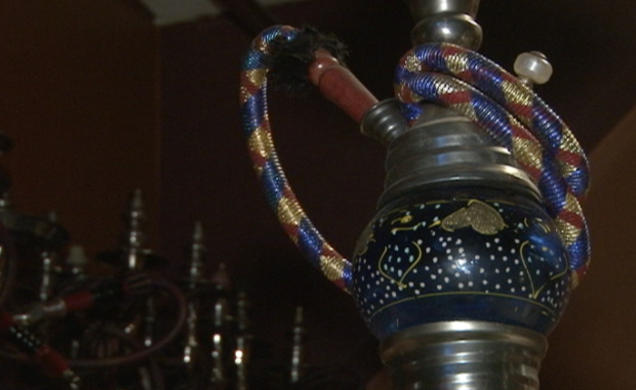In the past few years, smoking hookah has become an increasingly popular pastime.
In 2007, there were just six hookah bars in Maryland. Now, there are 31 locations that serve hookah and sell hookah products in the state.
But in Prince George’s County, the hookah bars that serve food along with hookah are violating a county code that says there can be no smoking in food establishments.
Ehab Asal, the owner of Prince Cafe, a local hookah bar with multiple locations, said many of his patrons are college-age adults between 18 and 21.
“When they just join the college, and they turn 18, they can’t go to a bar until 21, and they can come to hookah,” he said.
Credit: Annie Emberland/Capital News Service
In hookah smoking, a pastime with origins in the Middle East and India, tobacco smoke passes through water before being inhaled through a rubber hose.
A belief, that health experts say is inaccurate, about the comparative safety of the social pastime is common among young adults.
“It’s safer than smoking cigarettes,” Danielle Klock, 21, said.
Donald Shell, the Interim Director of the Center for Health Promotion, Education, Tobacco Use Prevention and Cessation for the Maryland Department of Health and Mental Hygiene, said smoking hookah does have health impacts.
“Using a hookah or water pipe presents a significant risk for the health of individuals,” he said.
Shell said the water does not filter the nicotine as commonly believed, and the long smoke sessions and deep inhalation pose a problem.
“It’s almost like sitting down and smoking 20 cigarettes at one time,” he said.
Shell said hookah use is also associated with tar, nicotine, carbon monoxide and carcinogens.
Shell said that, though hookah smokers only represent about 0.5 percent of adult smokers in Maryland, it is a problem around college campuses.
“It is a problem primarily on our college campuses and with our younger age groups as kind of a place to go hang out and to socialize,” he said.
However, some hookah smokers are aware of the detrimental impacts.
Twum Apau, 25, said, though he knows the potential impacts, he is not very concerned.
“Some people claim that because it goes through the water that it gets filtered somehow, some way, but I know there’s been studies that that’s not the case,” he said.
Apau began smoking hookah while living in Bahrain. It has now been about 12 years.
However, he said he does worry about the cleanliness of hookah pipes at hookah bars and uses a disposable mouthpiece when out.
“Because they’re serving so many people, I’m not sure how well they clean the hoses, how well they maintain the pipes and things like that,” Apau said.
In Prince George’s County, the hookah bars that serve food, like Prince Cafe, are considered eating establishments and inspected by the Health Department.
The hookah pipes are not checked in the inspections.
“There are no standards for hookah pipes,” said Alan Heck, the deputy manager of the Division of Environmental Health for the Prince George’s County Health Department.
Health officials say there are risks involved in sharing mouthpieces at hookah bars.
“We would hate for our younger adults and college age students to get a case of tuberculosis, herpes or hepatitis from sharing a mouthpiece at a hookah bar,” Shell said.
Another issue also exists. Prince George’s County law says smoking hookah and eating cannot occur in the same establishment.
“The operators of these establishments need to make a decision,” Heck said. “Do they want to have hookahs or do they want to serve food?”
However, Maryland regulations say they can serve food, as long as it is incidental.
“Hookahs are exempt from the Clean Indoor Air Act because they’re tobacconists, which means they sell primarily tobacco products,” Shell said.
Establishments in the county are expected to adhere to the stricter county regulations that say absolutely no serving both hookah and food. The Health Department says violations could result in civil reprimands that could lead to fines or criminal citations issued by the police.
The Prince George’s County Police Department says it does not issue this type of citation.
“If they continue to have food and to permit smoking, they will be taken through the legal process to its conclusion,” Heck said.
So far in College Park, the Health Department has cited Prince Cafe three times and Mosaic Cafe has been cited once.
However, last time inspectors visited Mosaic Cafe there was no evidence of smoking.

